Category: Jesus
Subject: Jesus
Comparing High Priests

Aaron, the older brother of Moses, was appointed to be the first High Priest of the nation of Israel. This was an office established by God under the Old Covenant, the Law that God gave to Moses to govern the Jews. Aaron was the first of many men who served in this capacity before Jesus. He was a descendent of Levi, hence the priesthood is known as the Levitical or Aaronic priesthood. Put simply, these were mere men, themselves guilty of sin, who yearly had to offer the blood of bulls and goats for atonement, first for themselves, and then for the people of Israel, (cf. Leviticus 16:1-5).
In the letter to the Hebrews, the Holy Spirit makes clear the differences between Jesus as High Priest, and those who went on before. Consider the following: Continue reading “Comparing High Priests” →
Jesus Our Shepherd

Jesus lived in a pastoral society. The images He used to illustrate points were very well known to his listeners. Fortunately for us urbanites, they are simple figures, and easily understood even by us 2000 years later. For example, John records these words of the Lord, “Most assuredly, I say to you, he who does not enter the sheepfold by the door, but climbs up some other way, the same is a thief and a robber. But he who enters by the door is the shepherd of the sheep. To him the doorkeeper opens, and the sheep hear his voice; and he calls his own sheep by name and leads them out. And when he brings out his own sheep, he goes before them; and the sheep follow him, for they know his voice. Yet they will by no means follow a stranger, but will flee from him, for they do not know the voice of strangers” (John 10:1-5). Continue reading “Jesus Our Shepherd” →
Jesus Christ – Done, Doing, Will Do

The lesson examines the ascension of Jesus, His present reign upon His throne, and His promise of a future return. All to benefit you and me!
Sermon Powerpoint View and Download:
<<———><><———>>
Mining the Scriptures: Matthew 2:13-18

In this text we have an example of great inhumanity. Herod the Great, concerned that his position might be threatened, committed clear murder of innocent children. The purpose was to destroy what he perceived to be a possible rival. However, the parents of Jesus were warned by an angel of God, and escaped from Herod to Egypt. They remained there until Herod died. The date is not exactly known, as differing assumptions render the birth of Jesus in different years. However, the interval was not long, as Herod died soon after, and his son reigned in his place. Hosea 11:1 was fulfilled, a foreshadowing of the Lord’s time spent in that foreign land.
In the interim, Herod had all the male children of Bethlehem and the region who were at or below the age of 2 killed, in a paranoid attempt to destroy Jesus. Traditional estimates of 14,000 to 144,00 infants killed are no doubt wildly exaggerated. It was more probably between 12-40 children. Regardless, it was brutality. It was also a fulfillment of Jeremiah 31:15, causing great pain and agony to many.
Jesus on the Cross
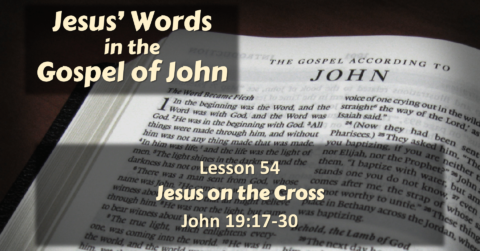
A discussion of the events of Jesus’ Crucifixion, and the words John recorded said by Jesus on that occasion.
Sermon: Jesus’ Questioning by the High Priest
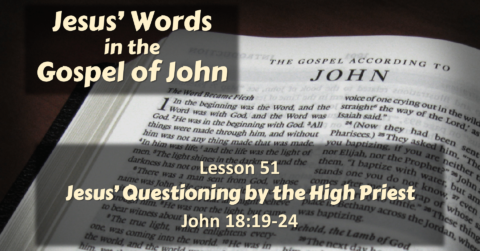
Our 51st lesson in our series on Jesus’ Words in John’s gospel references the conversation Jesus had with Annas in John 18:19-24.
The Arrest of Jesus
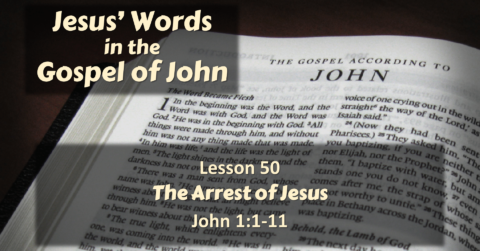
Continuing our series of Jesus’ words in John’s gospel, Stan addresses the arrest of Jesus in the Garden recorded in John 18:1-11.
Short Sermon: Jesus, A Servant of Men
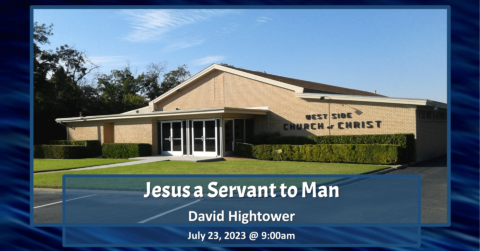
David Hightower relates in this short lesson how Jesus showed Himself willing to serve others. He washed the feet of the disciples. More to the point, He willingly gave up His life by dying on the cross. We should be servants as well.
Sermon: Jesus’ Prayer for You and Me
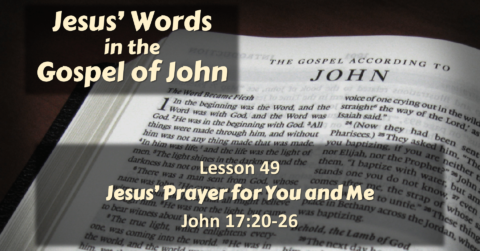
Stan discusses the final part of Jesus’ prayer in John 17. He prayer for disciples like you and me!
Sermon: Jesus Prays for His Disciples
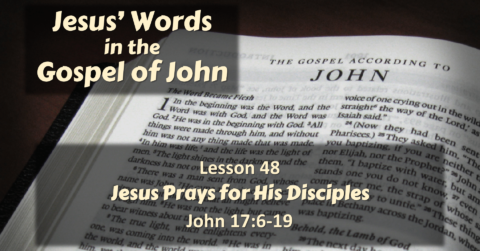
In the second of three lessons covering Jesus’ prayer in John 17, the emphasis is placed upon the petitions made to the Father on behalf of Jesus’ present disciples.
Mining the Scriptures: Colossians 1:19-20

It pleased the Father. This truth radiates throughout the scriptures. God’s intent, and pleasure in redeeming man through Jesus Christ. Paul wrote that it was in His mind since before time began, cf. Ephesians 1:4. So, when it happened, the Father was pleased. He said as much in Matthew 17:5, “This is My beloved Son, in whom I am well pleased. Hear Him!”
It is in Jesus that all “the fullness should dwell” (19). In this context is has reference to the preeminence of Christ. He fulfilled the Father’s intent in redemption. He is the Lord. He is the Savior. He is the “word” that became flesh (John 1:14) and created all. As verse 20 of our text states, Jesus is the one who reconciles all things to the Father, “whether things on earth or things in heaven.” Jesus accomplished this by shedding His blood on the cross of Calvary.
This is the proper answer to any ecumenical tendency. It is not what we think or wish. It is what pleased God the Father. And it pleased Him to reconcile all things through His Son.
Moses and Jesus – Servant and Son
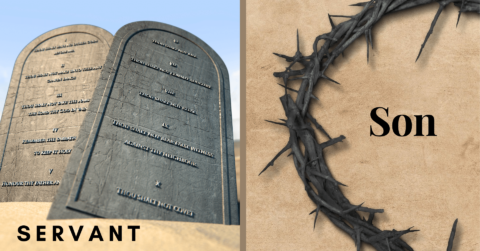
“Therefore, holy brethren, partakers of the heavenly calling, consider the Apostle and High Priest of our confession, Christ Jesus, 2 who was faithful to Him who appointed Him, as Moses also was faithful in all His house. 3 For this One has been counted worthy of more glory than Moses, inasmuch as He who built the house has more honor than the house. 4 For every house is built by someone, but He who built all things is God. 5 And Moses indeed was faithful in all His house as a servant, for a testimony of those things which would be spoken afterward, 6 but Christ as a Son over His own house, whose house we are if we hold fast the confidence and the rejoicing of the hope firm to the end” (Hebrews 3:1-6).
The book of Hebrews seeks to contrast all that surrounds Christ and His covenant with what came before. In every comparison made, Christ, and all that surrounds His life, ministry, death, covenant and body is better. It is fuller, more powerful, more important, more effective, more sublime.
The reason for this comparison was that Jews who had accepted Jesus as their Christ and Lord were reluctant to move on from the Law of Moses. This was unfortunate, and something that put their standing with God in jeopardy. This the writer made clear: “For on the one hand there is an annulling of the former commandment because of its weakness and unprofitableness, 19 for the law made nothing perfect; on the other hand, there is the bring in of a better hope, through which we draw near to God” (Hebrews 7:18-19).
One of the obvious comparisons would be between Moses and Jesus. Moses was the lawgiver. He would be considered by the Jews as the most important messenger from God. He was given the responsibility of shepherding Israel out of Egyptian bondage, leading them through the wilderness for a generation, and ushering them to the borders of Canaan. In all ways Moses was “faithful in His house” (Hebrews 3:2). Whose house? Not his own. Moses was a servant in the house of God.
The distinction is easy to see. “He who built the house has more honor than the house” (3). There is a great deal of difference between the Master of the house, its owner — and the servant. Jesus Christ is “a Son over His own house” (6) in contrast to the position of faithful servant attributed to Moses.
- Moses was a prophet, Jesus is the Son. “God, who at various ways spoke in time past to the fathers by the prophets, 2 has in these last days spoken to us by His Son” (1:1-2).
- Moses’ covenant was ushered in on the blood of animals, Jesus’ on His own blood. “For it is not possible that the blood of bulls and goats could take away sins” (10:4). “Therefore Jesus also, that He might sanctify the people with His own blood, suffered outside the gate” (13:12).
- No justification was to be found under Moses’ law, it comes through faith in Christ. “Therefore by the deeds of the law no flesh will be justified in His sight, for by the law is the knowledge of sin. 21 But now the righteousness of God apart from the law is revealed, being witnessed by the Law and the Prophets, 22 even the righteousness of God, through faith in Jesus Christ, to all and on all who believe…” (Romans 3:20-22).
- The intent of Moses’ law was to precede “those things which would be spoken afterward” (3:5), but Christ’s law is that which was spoken last (1:2). “But before faith came, we were kept under guard by the law, kept for the faith which would afterward be revealed. 24 Therefore the law was our tutor to bring us to Christ, that we might be justified by faith. 25 But after faith has come, we are no longer under a tutor” (Galatians 3:23-25).
- The Law of Moses ushered in an inferior priesthood to Christ, who is our High Priest after the order of Melchizedek. “But Christ came as High Priest of the good things to come, with the greater and more perfect tabernacle not made with hands, that is, not of this creation. 12 Not with the blood of goats and calves, but with His own blood He entered the Most Holy Place once for all, having obtained eternal redemption. 13 For if the blood of bulls and goats and the ashes of a heifer, sprinkling the unclean, sanctifies for the purifying of the flesh, 14 how much more shall the blood of Christ, who through the eternal Spirit offered Himself without spot to God, cleanse your conscience from dead works to serve the living God?” (Hebrews 9:11-14).
It is disheartening that even in our time religious people do not understand the significance of this contrast. There is a desire to make the appeal to the Law of Moses for authority and standing, not knowing that it abrogates our justification by faith in Christ Jesus. “You have become estranged from Christ, you who attempt to be justified by law; you have fallen from grace.” (Galatians 5:4). There is a difference between Moses and Jesus—The servant and the SON!
The Hour Has Come
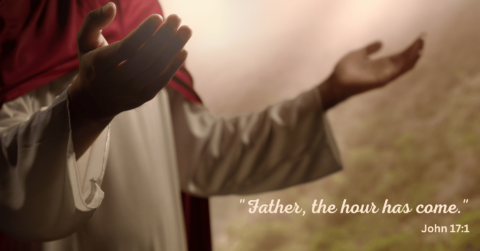
In John 17 we have recorded the prayer Jesus prayed to His Father in heaven, just before He was accosted and arrested in the Garden of Eden. Best estimates put His time of death between 12 and 15 hours later. As Jesus began His prayer to God, He said, “Father, the hour has come.” (17:1).
Consider that the events which culminated in Jesus’ sacrifice on the cross, securing the possibility of redemption to all sinners, had been in God’s mind since before the beginning of the universe.
“Blessed be the God and Father of our Lord Jesus Christ, who has blessed us with every spiritual blessing in the heavenly places in Christ, 4 just as He chose us in Him before the foundation of the world, that we should be holy and without blame before Him in love, 5 having predestined us to adoption as sons by Jesus Christ to Himself, according to the good pleasure of His will, 6 to the praise of the glory of His grace, by which He made us accepted in the Beloved. 7 In Him we have redemption through His blood, the forgiveness of sins, according to the riches of His grace” (Ephesians 1:3-7). Continue reading “The Hour Has Come” →
Sermon: The Names of Jesus

There are numerous titles used to refer the Jesus. We discuss words like Master, Lord, Messiah/Christ, Savior and Lamb of God, to show their meaning, and significance to Christians.
Sermon Powerpoint View and Download:
<<———><><———>>
Mining the Scriptures: Matthew 2:7-12
King Herod desired the destruction of his perceived rival, the prophesied Son of David. His instructions in our text were a ruse to enable him to assassinate the child. This is evident from verses 16-18.
We see the inability of men to accomplish any intent that God determines will not happen. The wise men departed in accord with Herod’s instructions, and did indeed find the child. They rejoiced, and worshiped Jesus, knowing He was the prophesied Savior. They shared gifts with the child. (Note: The fact that there are three gifts mentioned does not necessarily indicate three wise men. The traditions concerning the number and names of the wise men are merely speculation, not from scripture).
God defeated Herod’s plan by warning the wise men not to return to Herod. And so they returned to their own country rather than returning to Herod with the location of the child. No man, no matter how powerful, is able to thwart God’s scheme for redeeming man!
“Then Job answered the Lord and said: ‘I know that You can do everything, and that no purpose of Yours can be withheld from You’” (Job 42:1-2).





